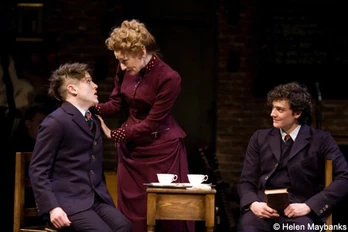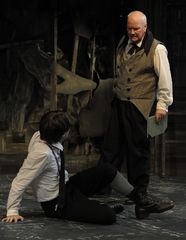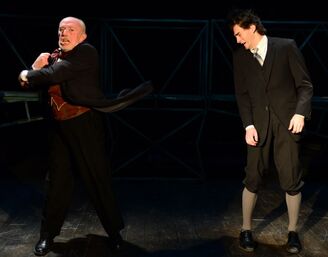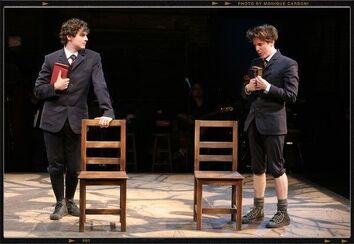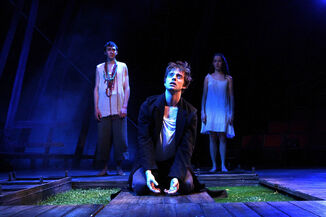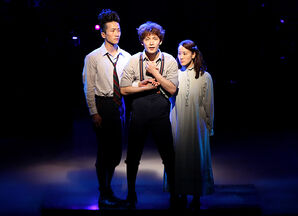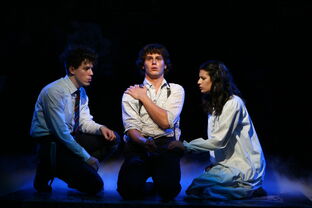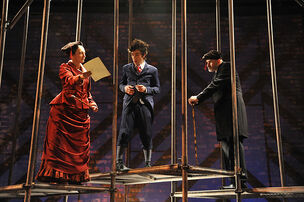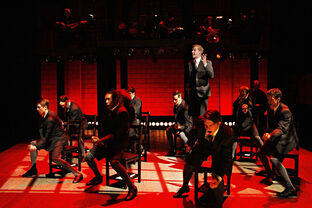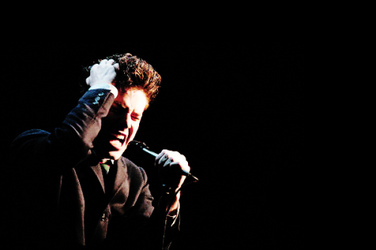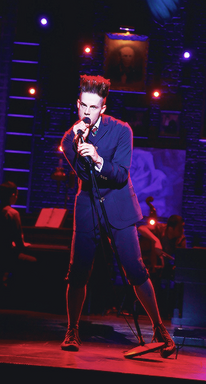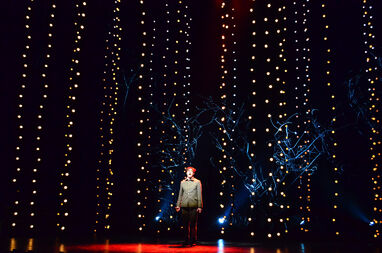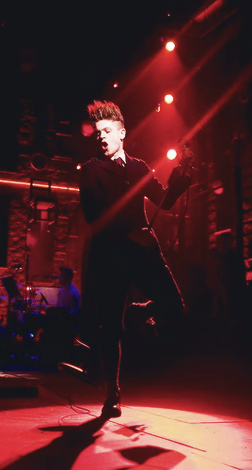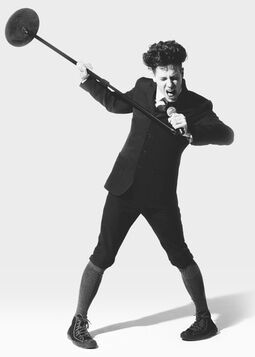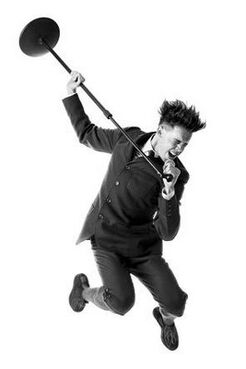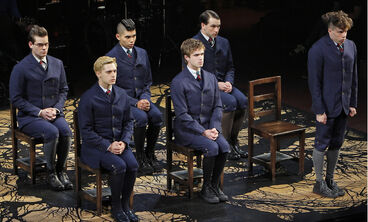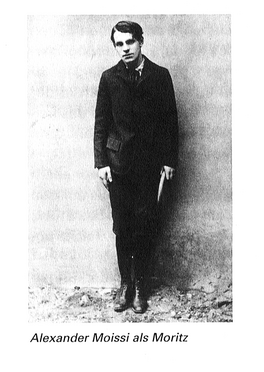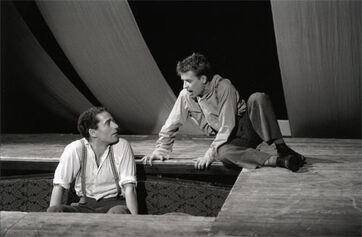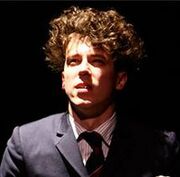(:)) Tag: Visual edit |
No edit summary |
||
| Line 1: | Line 1: | ||
| + | |||
| − | <nowiki> </nowiki>Moritz Stiefel is the secondary protagonist in the play and musical of Spring Awakening. He dies in both from the anxiety of school and neglect/abhorrence of his parents. [http://www.imdb.com/name/nm0302330/?ref_=nv_sr_1 John Gallagher, Jr.] played Moritz in the Original Broadway Cast. |
+ | <nowiki> </nowiki>Moritz Stiefel is the secondary protagonist in the play and musical of Spring Awakening. He dies in both from a suicide induced by the anxiety of school and neglect/abhorrence of his parents. [http://www.imdb.com/name/nm0302330/?ref_=nv_sr_1 John Gallagher, Jr.] played Moritz in the Original Broadway Cast and by [https://en.wikipedia.org/wiki/Daniel_Durant Daniel N Durant] in the 2015 Deaf West Broadway revival, with guitar and voice by [https://en.wikipedia.org/wiki/Alex_Boniello Alex Boneillo]. |
{{Infobox|Box title = Moritz Stiefel|Row 1 title = Age|Row 1 info = 15|Row 2 title = Occupation|Row 2 info = Student|Row 3 title = Relationships|Row 3 info = |
{{Infobox|Box title = Moritz Stiefel|Row 1 title = Age|Row 1 info = 15|Row 2 title = Occupation|Row 2 info = Student|Row 3 title = Relationships|Row 3 info = |
||
| Line 35: | Line 36: | ||
==Background== |
==Background== |
||
| − | Moritz Stiefel is a fifteen |
+ | Moritz Stiefel is a fifteen-year-old schoolboy, living in Germany in the 1890s. Moritz is terrified of failure and is awkward around his peers. In the musical and play his best friend is [[Melchior Gabor ]] (who is a year younger than Moritz, but far more knowledgeable on many subjects). |
[[Melchior Gabor|Melchior]] is considered to be a handsome genius and Moritz is considered quite the opposite. Moritz has been noted as a freak by his peers and a failure by his parents, causing him to be ostracized by all. Because of this, Moritz feels pressured to succeed in school and social life. |
[[Melchior Gabor|Melchior]] is considered to be a handsome genius and Moritz is considered quite the opposite. Moritz has been noted as a freak by his peers and a failure by his parents, causing him to be ostracized by all. Because of this, Moritz feels pressured to succeed in school and social life. |
||
| + | |||
| + | Much of Moritz character inspiration from the musical came from the Punk and Post Punk movements of the 80s. His songs use characteristics common to punk music much more than any other character, and his costume design was inspired by [https://en.wikipedia.org/wiki/Robert_Smith_(musician) Robert Smith] from [https://en.wikipedia.org/wiki/The_Cure The Cure]. |
||
== Plot == |
== Plot == |
||
When introduced to Moritz, it becomes clear that he is in tight competition with [[Ernst Röbel]] to be promoted at school. Both of them were originally given conditions to work off in order to keep their spot. |
When introduced to Moritz, it becomes clear that he is in tight competition with [[Ernst Röbel]] to be promoted at school. Both of them were originally given conditions to work off in order to keep their spot. |
||
| − | Moritz was very stressed over the time between his first promotion and his flunking out, to the point where he wasn't sleeping. [[Melchior Gabor|Melchior]] tries to tutor Moritz |
+ | Moritz was very stressed over the time between his first promotion and his flunking out, to the point where he wasn't sleeping. [[Melchior Gabor|Melchior]] tries to tutor Moritz helping him to pass his exam, but due to the number of students they could promote, the teachers thought he wasn't worth the effort and wouldn't reflect well on the school, therefore, they failed him. |
| + | Moritz's father ([[Rentier Stiefel]]) beat and then threatened to disown him if he were to flunk out of school. To avoid this fate Moritz attempted to flee to America by asking[[Fanny Gabor|Frau Gabor]] for a large sum of money. She refuses and offers to write to his parents in compensation. Despite this, Moritz decides that the only course of action is to kill himself. |
||
| ⚫ | Moritz |
||
| + | |||
| ⚫ | Moritz wanders the town at dusk, carrying a pistol. It is then that he runs into [[Ilse Neumann|Ilse]], an old childhood friend and playmate. She invites him to walk her home, as an attempt to prevent his suicide. He refuses and eventually causes Ilse to leave. Moritz soon realizes that Ilse was his last chance of escaping and calls after her but it is too late. |
||
In some adaptations of the musical, Moritz proceeds to silence his voice by taking his microphone before signing his monologue and shooting himself. In the play, however, Moritz had been fascinated by [[the Headless Queen]] so he decapitates himself with the bullet (supposedly the gun was filled with water). |
In some adaptations of the musical, Moritz proceeds to silence his voice by taking his microphone before signing his monologue and shooting himself. In the play, however, Moritz had been fascinated by [[the Headless Queen]] so he decapitates himself with the bullet (supposedly the gun was filled with water). |
||
| − | In both adaptations Moritz attempts to persuade Melchior towards death. In the play Moritz appears headless in the graveyard, and tries to convince [[Melchior Gabor|Melchior]] to join him in the afterlife. However, [[Melchior Gabor|Melchior]] refuses and asks Moritz to wait until he's old, then he will take Moritz's hand and follow him through to death. In the musical Moritz and [[Wendla Bergmann|Wendla]] appear in the Graveyard. Originally Wendla is the influence for life in Melchior, saying that his sins are forgiven, and all he will ever be is still there waiting for him. Whereas originally Moritz is Melchior's influence for death, saying that he has nothing to live for without his family and friends. Eventually, however both join to support Melchior through this troubled time. |
+ | In both adaptations, Moritz attempts to persuade Melchior towards death in the final scene. In the play, Moritz appears headless in the graveyard, and tries to convince [[Melchior Gabor|Melchior]] to join him in the afterlife. However, [[Melchior Gabor|Melchior]] refuses and asks Moritz to wait until he's old, then he will take Moritz's hand and follow him through to death. In the musical Moritz and [[Wendla Bergmann|Wendla]] appear in the Graveyard. Originally Wendla is the influence for life in Melchior, saying that his sins are forgiven, and all he will ever be is still there waiting for him. Whereas originally Moritz is Melchior's influence for death, saying that he has nothing to live for without his family and friends. Eventually, however, both join to support Melchior through this troubled time. |
== Personality == |
== Personality == |
||
| − | Moritz is introverted, intense and nervous. He strives to do well but is easily distracted and feels he will not become anything of worth unless succeeds in school. He is confused about his sexuality |
+ | Moritz is introverted, intense and nervous. He strives to do well but is easily distracted and feels he will not become anything of worth unless succeeds in school. He is confused about his sexuality and gets easily flustered. |
| + | In the play, Moritz is far more introspective than his musical adaptation. In the play, Moritz says |
||
| + | |||
| + | <p style="text-align:center;">Man’s sense of shame is just a product of his education</p> |
||
| + | |||
| + | which was given to Melchior in the musical. |
||
| + | |||
| ⚫ | |||
| + | |||
==Fun Facts== |
==Fun Facts== |
||
| Line 57: | Line 70: | ||
*Profoundly deaf in the Deaf West version of the musical and fails because of a bias against deaf students. |
*Profoundly deaf in the Deaf West version of the musical and fails because of a bias against deaf students. |
||
| − | **Moritz is severely discriminated against for being Deaf and the teacher enacts a brutal oral method on him that is shown to be destructive (the same is done to [[Otto Lammermeier]] and [[Ernst Robel]], but Otto responds better than the other boys). Michael Arden states in the playbill that Moritz was marked as an "oral failure", meaning he could not talk and, because of the eugenics at that time and the Milan Conference, was considered worthless. In the Deaf West Revival, this and his father's shame at his son being |
+ | **Moritz is severely discriminated against for being Deaf and the teacher enacts a brutal oral method on him that is shown to be destructive (the same is done to [[Otto Lammermeier]] and [[Ernst Robel]], but Otto responds better than the other boys). Michael Arden states in the playbill that Moritz was marked as an "oral failure", meaning he could not talk and, because of the eugenics at that time and the Milan Conference, was considered worthless. In the Deaf West Revival, this and his father's shame at his son being labelled as such are serious factors in Moritz's suicide. |
| − | **In the Deaf West production a teacher makes fun of Moritz's voice |
+ | **In the Deaf West production, a teacher makes fun of Moritz's voice |
| − | *Passed his exam, but due to amount of students they could promote and the teachers thinking he wasn't worth the effort and/or wouldn't reflect well on the school, he was failed. |
||
*His father works at a bank. |
*His father works at a bank. |
||
*Considers Melchior's mother, Fanny Gabor, a friend/second mother; however, many productions also play him as being sexually and/or romantically attracted to her |
*Considers Melchior's mother, Fanny Gabor, a friend/second mother; however, many productions also play him as being sexually and/or romantically attracted to her |
||
*Due to lines in the play about Moritz wanting to experience how a woman feels in sex, and due to his admiration and connection to the Headless Queen, there is scholarly speculation that Moritz is queer and/or transgender. |
*Due to lines in the play about Moritz wanting to experience how a woman feels in sex, and due to his admiration and connection to the Headless Queen, there is scholarly speculation that Moritz is queer and/or transgender. |
||
| − | **There are, in general, lots of arguments over his sexuality; Alex Boniello says he (Voice of Moritz in the Deaf West revival) portrayed him as straight, but many believe |
+ | **There are, in general, lots of arguments over his sexuality; Alex Boniello says he (Voice of Moritz in the Deaf West revival) portrayed him as straight, but many believe he is bisexual or gay. |
*Stiefel is a Jewish surname. |
*Stiefel is a Jewish surname. |
||
| ⚫ | |||
*Moritz has an aversion to Hanschen in the musical, as is shown during the scene where finds out he has passed his final. He hugs each boy, except for Hanschen. |
*Moritz has an aversion to Hanschen in the musical, as is shown during the scene where finds out he has passed his final. He hugs each boy, except for Hanschen. |
||
| − | **In the play, he implies that he thinks Hanschen is a liar and a show off but they are clearly friends. Hanschen is kind to him in the scene he finds out he passed, congratulating him and worrying about him getting caught. |
||
| − | *In the play, Moritz says the line about shame being an invention of the school system, not Melchior like in the musical. |
||
*In the 1NT of Spring Awakening, a box was mounted on the wall. During Left Behind, lights would light up on the inside and reveal Moritz's headless body. It's basically a representation of his coffin. |
*In the 1NT of Spring Awakening, a box was mounted on the wall. During Left Behind, lights would light up on the inside and reveal Moritz's headless body. It's basically a representation of his coffin. |
||
*He is the only character to not be in "I Believe" and "The Guilty Ones" showing he is not only literally isolated from all of the other characters in this moment, but also metaphorically due to his exclusion from these numbers with the rest of the cast |
*He is the only character to not be in "I Believe" and "The Guilty Ones" showing he is not only literally isolated from all of the other characters in this moment, but also metaphorically due to his exclusion from these numbers with the rest of the cast |
||
| − | *If he were any fruit he'd be a Guava! |
+ | *If he were any fruit he'd be a Guava! |
| − | *Moritz owned a worm on a string |
+ | *Moritz owned a worm on a string |
== Pictures == |
== Pictures == |
||
Revision as of 06:04, 25 November 2018
Moritz Stiefel is the secondary protagonist in the play and musical of Spring Awakening. He dies in both from a suicide induced by the anxiety of school and neglect/abhorrence of his parents. John Gallagher, Jr. played Moritz in the Original Broadway Cast and by Daniel N Durant in the 2015 Deaf West Broadway revival, with guitar and voice by Alex Boneillo.
Background
Moritz Stiefel is a fifteen-year-old schoolboy, living in Germany in the 1890s. Moritz is terrified of failure and is awkward around his peers. In the musical and play his best friend is Melchior Gabor (who is a year younger than Moritz, but far more knowledgeable on many subjects).
Melchior is considered to be a handsome genius and Moritz is considered quite the opposite. Moritz has been noted as a freak by his peers and a failure by his parents, causing him to be ostracized by all. Because of this, Moritz feels pressured to succeed in school and social life.
Much of Moritz character inspiration from the musical came from the Punk and Post Punk movements of the 80s. His songs use characteristics common to punk music much more than any other character, and his costume design was inspired by Robert Smith from The Cure.
Plot
When introduced to Moritz, it becomes clear that he is in tight competition with Ernst Röbel to be promoted at school. Both of them were originally given conditions to work off in order to keep their spot.
Moritz was very stressed over the time between his first promotion and his flunking out, to the point where he wasn't sleeping. Melchior tries to tutor Moritz helping him to pass his exam, but due to the number of students they could promote, the teachers thought he wasn't worth the effort and wouldn't reflect well on the school, therefore, they failed him.
Moritz's father (Rentier Stiefel) beat and then threatened to disown him if he were to flunk out of school. To avoid this fate Moritz attempted to flee to America by askingFrau Gabor for a large sum of money. She refuses and offers to write to his parents in compensation. Despite this, Moritz decides that the only course of action is to kill himself.
Moritz wanders the town at dusk, carrying a pistol. It is then that he runs into Ilse, an old childhood friend and playmate. She invites him to walk her home, as an attempt to prevent his suicide. He refuses and eventually causes Ilse to leave. Moritz soon realizes that Ilse was his last chance of escaping and calls after her but it is too late.
In some adaptations of the musical, Moritz proceeds to silence his voice by taking his microphone before signing his monologue and shooting himself. In the play, however, Moritz had been fascinated by the Headless Queen so he decapitates himself with the bullet (supposedly the gun was filled with water).
In both adaptations, Moritz attempts to persuade Melchior towards death in the final scene. In the play, Moritz appears headless in the graveyard, and tries to convince Melchior to join him in the afterlife. However, Melchior refuses and asks Moritz to wait until he's old, then he will take Moritz's hand and follow him through to death. In the musical Moritz and Wendla appear in the Graveyard. Originally Wendla is the influence for life in Melchior, saying that his sins are forgiven, and all he will ever be is still there waiting for him. Whereas originally Moritz is Melchior's influence for death, saying that he has nothing to live for without his family and friends. Eventually, however, both join to support Melchior through this troubled time.
Personality
Moritz is introverted, intense and nervous. He strives to do well but is easily distracted and feels he will not become anything of worth unless succeeds in school. He is confused about his sexuality and gets easily flustered. In the play, Moritz is far more introspective than his musical adaptation. In the play, Moritz says
Man’s sense of shame is just a product of his education
which was given to Melchior in the musical.
However, in both productions, Moritz shows signs of neurodivergence, specifically anxiety, autism, depression, and/or bipolar disorder.
Fun Facts
- Moritz's vocal type is tenor.
- Profoundly deaf in the Deaf West version of the musical and fails because of a bias against deaf students.
- Moritz is severely discriminated against for being Deaf and the teacher enacts a brutal oral method on him that is shown to be destructive (the same is done to Otto Lammermeier and Ernst Robel, but Otto responds better than the other boys). Michael Arden states in the playbill that Moritz was marked as an "oral failure", meaning he could not talk and, because of the eugenics at that time and the Milan Conference, was considered worthless. In the Deaf West Revival, this and his father's shame at his son being labelled as such are serious factors in Moritz's suicide.
- In the Deaf West production, a teacher makes fun of Moritz's voice
- His father works at a bank.
- Considers Melchior's mother, Fanny Gabor, a friend/second mother; however, many productions also play him as being sexually and/or romantically attracted to her
- Due to lines in the play about Moritz wanting to experience how a woman feels in sex, and due to his admiration and connection to the Headless Queen, there is scholarly speculation that Moritz is queer and/or transgender.
- There are, in general, lots of arguments over his sexuality; Alex Boniello says he (Voice of Moritz in the Deaf West revival) portrayed him as straight, but many believe he is bisexual or gay.
- Stiefel is a Jewish surname.
- Moritz has an aversion to Hanschen in the musical, as is shown during the scene where finds out he has passed his final. He hugs each boy, except for Hanschen.
- In the 1NT of Spring Awakening, a box was mounted on the wall. During Left Behind, lights would light up on the inside and reveal Moritz's headless body. It's basically a representation of his coffin.
- He is the only character to not be in "I Believe" and "The Guilty Ones" showing he is not only literally isolated from all of the other characters in this moment, but also metaphorically due to his exclusion from these numbers with the rest of the cast
- If he were any fruit he'd be a Guava!
- Moritz owned a worm on a string
Pictures

